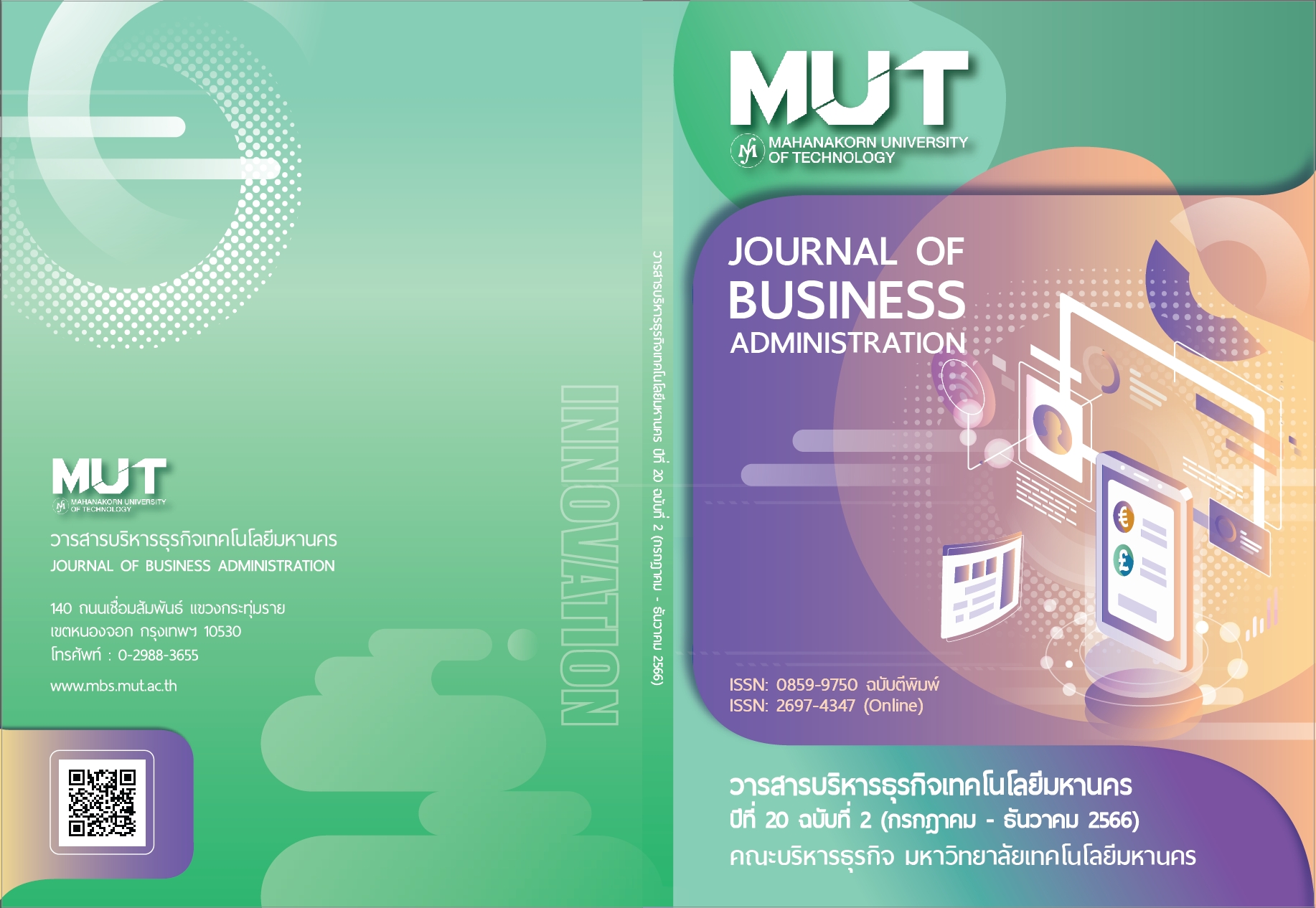The Effect of Gender of Board of Directors and Corporate Governance on the Level of Corporate Social Responsibility Disclosure of Listed Companies in the Stock Exchange of Thailand
Keywords:
Corporate Governance, Gender, Board of Directors, Corporate Social ResponsibilityAbstract
This study aims to examine the relationship between the gender of the board of directors, corporate governance, and social responsibility operations including the moderating effect of corporate governance on the relationship between the gender of the board of directors and social responsibility operations of listed companies in the stock exchange of Thailand. The data were collected from the annual reports and 56-1 forms of 483 companies in the year B.E. 2557 to B.E. 2561, resulting in a total of 2,308 observations.
The results indicated that 30.34% of the listed companies had at least three female members on their board of directors. Additionally, 71.20% of these companies achieved rankings in the excellent, very good, and good levels of corporate governance. On average, these companies obtained a corporate social responsibility disclosure score of 0.56 out of a maximum score of 1. Based on the results of the multiple regression analysis, it was found that 1) listed companies with a higher proportion of female representation on their board of directors had higher level of corporate social responsibility disclosure, 2) there was a positive effect of corporate governance on the level of corporate social responsibility disclosure, and 3) there was no effect of corporate governance on the relationship between the gender of boards of directors and level of corporate social responsibility disclosure.
Therefore, if companies wish to support improved disclosure of social responsibility, which positively impacts the corporate image, they may consider increasing the proportion of female board members and promoting better corporate governance. Additionally, if regulatory authorities aim to enhance the disclosure of social responsibility by listed companies in the stock exchange of Thailand, they may address the issue of board composition by considering demographic factors, including gender diversity.
References
Aguilera, R., Desender, K. and Lamy, M. L. 2020. Bridging accounting and corporate governance: New avenues of research. The International Journal of Accounting. Vol. 56. No. 1. 1 – 21.
Aristananda, A. and Risman, A. 2022. The effect of firm size, profitability, and leverage on corporate social responsibility. Indikator. Vol. 6. No. 3. 105 – 117.
Baatwah, S. R. and Wahab, E. A. A. 2023. Women and CSR budgeting and spending: Does ownership enhance their CSR role? Business Ethics, the Environment & Responsibility, Vol. 32. No. 4. 1277 – 1296.
Brammer, S. and Millington, A. 2006. Organizational slack and the composition of corporate community involvement. Paper presented at the Academy of Management Conference.
Buertey, S. 2021. Board gender diversity and corporate social responsibility assurance: The moderating effect of ownership concentration. Corporate Social Responsibility and Environmental Management. Vol. 28 No. 6. 1579 – 1590.
Buertey, S. and Pae, H. 2021. Corporate governance and forward-looking information disclosure: Evidence from a developing country. Journal of African Business. Vol. 22 No. 3. 293 – 308.
Ciocirlan, C. and Pettersson, C. 2012. Does workforce diversity matter in the fight against climate change? An analysis of Fortune 500 companies. Corporate Social Responsibility and Environmental Management. Vol. 19. No. 1. 47 – 62.
Cullen, L. and Christopher, T. 2002. Governance disclosures and firm characteristics of listed Australian mining companies. International Journal of Business Studies. Vol. 10. No. 1. 37 – 58.
Dawson, L. M. 1997. Ethical differences between men and women in the sales profession. Journal of Business Ethics. Vol. 16. 1143 – 1152.
Dedman, E., Kausar, A. and Lennox, C. 2014. The demand for audit in private firms: Recent large-sample evidence from the UK. European Accounting Review. Vol. 23 No. 1. 1 – 23.
Del Carmen Valls Martínez, M., Cruz Rambaud, S. and Parra Oller, I. M. 2019. Gender policies on board of directors and sustainable development. Corporate Social Responsibility and Environmental Management. Vol. 26 No. 6. 1539 – 1553.
Dias, A., Rodrigues, L. L. and Craig, R. 2017. Corporate governance effects on social responsibility disclosures. Australasian accounting business and finance journal. Vol. 11. No. 2. 1 – 22.
Fernandez-Feijoo, B., Romero, S. and Ruiz-Blanco, S. 2014. Women on boards: Do they affect sustainability reporting. Corporate Social Responsibility and Environmental Management. Vol. 21. No. 6. 351 – 364.
Freeman, R. E. and Phillips, R. A. 2023. Stakeholder Theory: A Libertarian Defense. In R. Edward Freeman (eds), R. Edward Freeman’s Selected Works on Stakeholder Theory and Business Ethics. 157 – 174.
Friedman, M. 1987. Beyond caring: The de-moralization of gender. Canadian Journal of Philosophy. Vol. 17. 87 – 110.
Frynas, J. G. and Yamahaki, C. 2016. Corporate social responsibility: Review and roadmap of theoretical perspectives. Business Ethics: A European Review. Vol. 25 No. 3. 258 – 285.
Furlotti, K., Mazza, T., Tibiletti, V. and Triani, S. 2019. Women in top positions on boards of directors: Gender policies disclosed in Italian sustainability reporting. Corporate Social Responsibility and Environmental Management. Vol. 26 No. 1. 57 – 70.
Garcia, L., Gago, R. and Nieto, M. 2017. Corporate social responsibility, board of directors, and firm performance: An analysis of their relationships. Review of Managerial Science. Vol. 10. No. 1. 1 – 20.
Guo, M. and Zheng, C. 2021. Foreign ownership and corporate social responsibility: Evidence from China. Sustainability. Vol. 13. No. 2. 1 – 22.
Hair, J. F. Jr., Babin, B. J., Anderson, R. E. and Black, W. C. 2018. Multivariate Data Analysis. Cengage.
Hawkins, D. 2006. Corporate Social Responsibility: Balancing Tomorrow’s Sustainability and Today’s Profitability. New York: Palgrave Macmillan.
Huaipad, S. 2007. The relationship between the quality of social responsibility disclosures and good corporate governance of firms listed in the Stock Exchange of Thailand. Master of Accounting. Chulalongkorn University.
Ioannou, I. and Serafeim, G. 2017. The consequences of mandatory corporate sustainability reporting [Working paper]. Harvard Business School Research.
Issa, A. and Fang, H. X. 2019. The impact of board gender diversity on corporate social responsibility in the Arab Gulf states. Gender in Management. Vol. 34. No. 7. 577 – 605.
Iturriaga, J. and Foronda. 2009. Corporate Social Responsibility and Large Shareholders: An Analysis of European Firms. University of Burgos.
Jain, T. and Jamali, D. 2016. Looking inside the black box: The effect of corporate governance on corporate social responsibility. Corporate governance: An International Review. Vol. 24 No. 3. 253 – 273.
Janchom, S. 2010. The Relationship Between Organizational Size and the Level of Social Responsibility Disclosure of Companies in the Industrial Product Group Registered in the Stock Exchange of Thailand. Master of Accounting. Thammasat University.
Jeevanantham, M. and Subramanian, S. M. 2023. A study on corporate governance towards CSR practices. IJARIIE. Vol. 9. No. 5. 172 – 176.
Jensen, M. and Meckling, W. 1976. Theory of the firms: Managerial behavior, agency costs and ownership structure. Journal of Financial Economics. Vol. 3. No. 4. 305 – 360.
Kahreh, M. S., Babania, A., Tive, M. and Mirmehdi, S. M. 2014. An examination to effects of gender differences on the corporate social responsibility (CSR). Procedia-Social and Behavioral Sciences. Vol. 109. 664 – 668.
Lagasio, V. and Cucari, N. 2019. Corporate governance and environmental social governance disclosure: A meta-analytical review. Corporate Social Responsibility and Environmental Management. Vol 24. No 4. 701 – 711.
Lai, K., Srinidhi, B., Gul, F. and Tsui, J. 2017. Board gender diversity, auditor fees, and auditor choice. Contemporary Accounting Research. Vol. 34. 1681 – 1714.
Latapí Agudelo, M. A., Jóhannsdóttir, L. and Davídsdóttir, B. 2019. A literature review of the history and evolution of corporate social responsibility. International Journal Corporate Social Responsibility. Vol. 4. No. 1. 1 – 23.
Li, W. and Zhang, R. 2010. Corporate social responsibility, ownership structure, and political interference: Evidence from China. Journal of Business Ethics. Vol. 96. 631 – 645.
Lin, C. C. and Nguyen, T. P. 2022. The impact of ownership structure on corporate social responsibility performance in Vietnam. Sustainability. Vol. 14, 1 – 13.
McGuinness, P. B., Vieito, J. P. and Wang, M. 2017. The role of board gender and foreign ownership in the CSR performance of Chinese listed firms. Journal of Corporate Finance. Vol. 42. 75 – 99.
Nadeem, M. 2020. Does board gender diversity influence voluntary disclosure of intellectual capital in initial public offering prospectuses? Evidence from China. Corporate Governance: An International Review. Vol. 28 No. 2. 100 – 118.
Nadeem, M., Zaman, R. and Saleem, I. 2017. Boardroom gender diversity and corporate sustainability practices: Evidence from Australian securities exchange listed firms. Journal of Cleaner Production. Vol. 149. 874 – 88.
Naklerd, S. and Suttipun, M. 2016. An influence of corporate governance on environment disclosures of listed companies in the Stock Exchange of Thailand. Chulalongkorn Business Review. Vol. 38 No. 149. 1 – 37.
Ng, E. J. and Koh, H. C. 1994. An agency theory and profit analytic approach to corporate non-mandatory disclosure compliance. Asia-Pacific Journal of Accounting. Vol. 1. No.1. 29 – 44.
Rao, K. and Tilt, C. 2016. Board composition and corporate social responsibility: The role of diversity, gender, strategy and decision making. Journal of Business Ethics. Vol. 138. No. 2. 327 – 347.
Ricci, F., Scafarto, V. and della Corte, G. 2023. Board Gender Diversity, Female Leaders and Corporate Environmental Responsibility: A Structured Literature Review. In Paoloni, P., Lombardi, R. (eds), When the Crisis Becomes an Opportunity. SIDREA Series in Accounting and Business Administration. 411 – 413. Springer. Cham.
Roberts, R. W. 1992. Determinants of corporate social responsibility disclosure: An application of stakeholder theory. Accounting, Organizations and Society. Vol. 17. No. 6. 595 – 612.
Santovec, M. L. 2019. A woman leader's ethic of care. Women in Higher Education. Vol. 28. No. 3. 13 - 15.
Setó-Pamies, D. 2015. The relationship between women directors and corporate social responsibility. Corporate Social Responsibility and Environmental Management. Vol. 22. No. 6. 334 – 345.
Solomon, J. 2020. Corporate governance and accountability. Hoboken, NJ: John Wiley & Sons.
The Stock Exchange of Thailand. 2019. Companies/Securities Info. – Company List. Retrieved March 1, 2019 from https://portal.set.or.th/th/company/companylist.html
Sukhsanit, K. 2016. Characteristics of managers and profit manipulation. Master of Accounting, Thammasat University.
Ullmann, A. A. 1985. Data in search of a theory: a critical examination of the relationship among social performance, social disclosure and economic performance. Academy of Management Review. Vol. 10. No. 1 - 2. 540 – 557.
Yasser, Q. R., Al Mamun, A. and Ahmed, I. 2017. Corporate social responsibility and gender diversity: Insights from Asia Pacific. Corporate Social Responsibility and Environmental Management. Vol. 24 No. 3. 210 – 221.
Downloads
Published
Issue
Section
License

This work is licensed under a Creative Commons Attribution-NonCommercial-NoDerivatives 4.0 International License.
ข้อความ ข้อคิดเห็น ข้อมูล เนื้อหา รูปภาพ แผนภูมิ แผนผัง เป็นต้น ที่ปรากฏและแสดงในบทความต่างๆ ในวารสารบริหารธุรกิจเทคโนโลยีมหานคร ถือเป็นความรับผิดชอบโดยตรงของผู้เขียนบทความนั้นๆ มิใช่เป็นความรับผิดชอบใดๆ ของวารสารบริหารธุรกิจเทคโนโลยีมหานคร และมหาวิทยาลัยเทคโนโลยีมหานคร
บทความที่ตีพิมพ์ในวารสารบริหารธุรกิจเทคโนโลยีมหานคร ถือเป็นลิขสิทธิ์เฉพาะของคณะบริหารธุรกิจ มหาวิทยาลัยเทคโนโลยีมหานคร หากบุคคลหรือหน่วยงานใดต้องการนำทั้งหมดหรือส่วนใดส่วนหนึ่งไปเผยแพร่ต่อหรือเพื่อกระทำการใดๆ จะต้องได้รับการอนุญาตเป็นลายลักษณ์อักษรจากคณะบริหารธุรกิจ มหาวิทยาลัยเทคโนโลยีมหานครก่อนเท่านั้น


